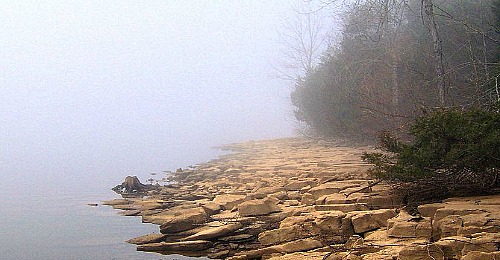Tennessee State Parks
Tennessee State Parks Are Among The Most Popular Of The Tennessee Tourist Attractions
There are fifty two state parks in Tennessee which is a state located in the south eastern part of America. In such a wonderfully scenic area the state parks are among the most popular of the Tennessee tourist attractions.
|
To see the complete list of Tennessee State Parks Just Click Here |
The fact that the Great Smoky Mountains National Park in Tennessee receives more visitors than any other National Park says a lot about the beauty of the region. Geographically Tennessee is divided into three different regions. They are East, West and Middle Tennessee. |

Unusual Animal Shaped Shadow Cast By One Of The Blue Ridge Mountains
East Tennessee is made up of the forested, rugged terrain of the Blue Ridge Mountains. Actually, this range is a series of smaller ranges such as The Bald Mountains, Iron Mountains, Unicoi Mountains, Roan Highlands and The Great Smoky Mountains.
Clingmans Dome, at 6,643 feet above sea level, is in this region of Tennessee and it is the highest point in the state. The land consists of forested ridges and fertile valleys with rivers that flow down into the Tennessee River. The major cities of Knoxville and Chattanooga are found here.
Warriors Path State Park, Roan Mountain State Park, Harrison Bay State Park and Frozen Head State Park are just a few of the Tennessee State Parks to be found in this eastern region.
 Beautiful Waterfall At Fall Creek Falls State Park |
To the west of the Tennessee River valley, the land rises to an area called the Cumberland Plateau and then into the middle section of Tennessee. The state capitol, Nashville is located here, as well as the towns of Clarksville and Murfreesboro. Middle Tennessee was the eastern end of an ancient route created by Native Americans called the Natchez Trace. This linked Tennessee to the town of Natchez in Mississippi. The Tennessee State Parks located in this mid section of the state include David Crockett State Park, Fall Creek Falls State Park and Rock Island State Park. The third and final section of the state is west Tennessee. This area runs westward from the Tennessee River to the state border, which is the Mississippi River. |
The land consists of gently rolling hills and streams which flow to become tributaries of the great Mississippi. The area is sometimes known as the Tennessee Bottoms and it is here that Memphis, the largest city in the state, is located.
The Tennessee State Parks found in this western region include Chickasaw State Park, Pinson Mounds State Park and Reelfoot Lake State Park.
Although ancient Native American tribes had inhabited the region for thousands of years, when the first European explorers arrived the Muscogee and Yuchi tribes were in residence.
However, they were shortly displaced by the Cherokee who moved west out of Virginia because of the evey increasing influx of white settlers.
Like much of this part of America, the first white explorers were the Spanish who arrived in the 16th century. It was the 18th century that saw the arrival of British settlers and the "long hunters" out of neighboring Virginia.

A Misty Morning On The Shores Of J.Percy Priest Lake At Long Hunter State Park
These hunting parties received this peculiar name because of the distance they travelled and the length of time they spent on these trips.
One of the state parks in Tennessee is called Long Hunter State Park in memory of these intrepid men.
Tennessee became the 16th state to join the Union which it did on June 1st 1796 and it was the first state created from land already under the control of the Federal Government.
When the Civil War broke out in 1861, Tennessee was the last state to join the Confederacy but they were to supply more soldiers to the cause than any of the other southern states.
However, it was also a state with deeply divided sympathies as more men fought for the Union Army than from any of the other Confederate States.
Nathan Bedford Forrest, the famous Confederate cavalry general, is remembered by having one of the Tennessee State Parks named in his honor.

The Grave Of Sgt. Alvin C.Yorke
Yet another of the state parks in Tennessee is named after a military man. Sgt. Alvin C. Yorke State Park is named after possibly the most notable soldier in American history. He was awarded the Congressional Medal of Honor for his exploits in France during World War One.
The Great Depression of the 1930`s saw hardship all over America, nowhere more so than in Tennessee. The need to create work , provide electric power for rural areas and control flooding in the state led to the formation of the Tennessee Valley Authority. (TVA)

The T.V.A. Norris Dam Across The Clinch River
The construction of the Norris Dam across the Clinch River in 1936 was a major project and helped to achieve the three aims of the TVA.
Tennessee State Parks constructed by the Civilian Conservation Corps and the TVA include Norris Dam State Park, Big Ridge State Park and Cove Lake State Park.
Here is a list of the Tennessee State Parks
|
|
Here is a map of Tennessee. Note how many other states border it.






